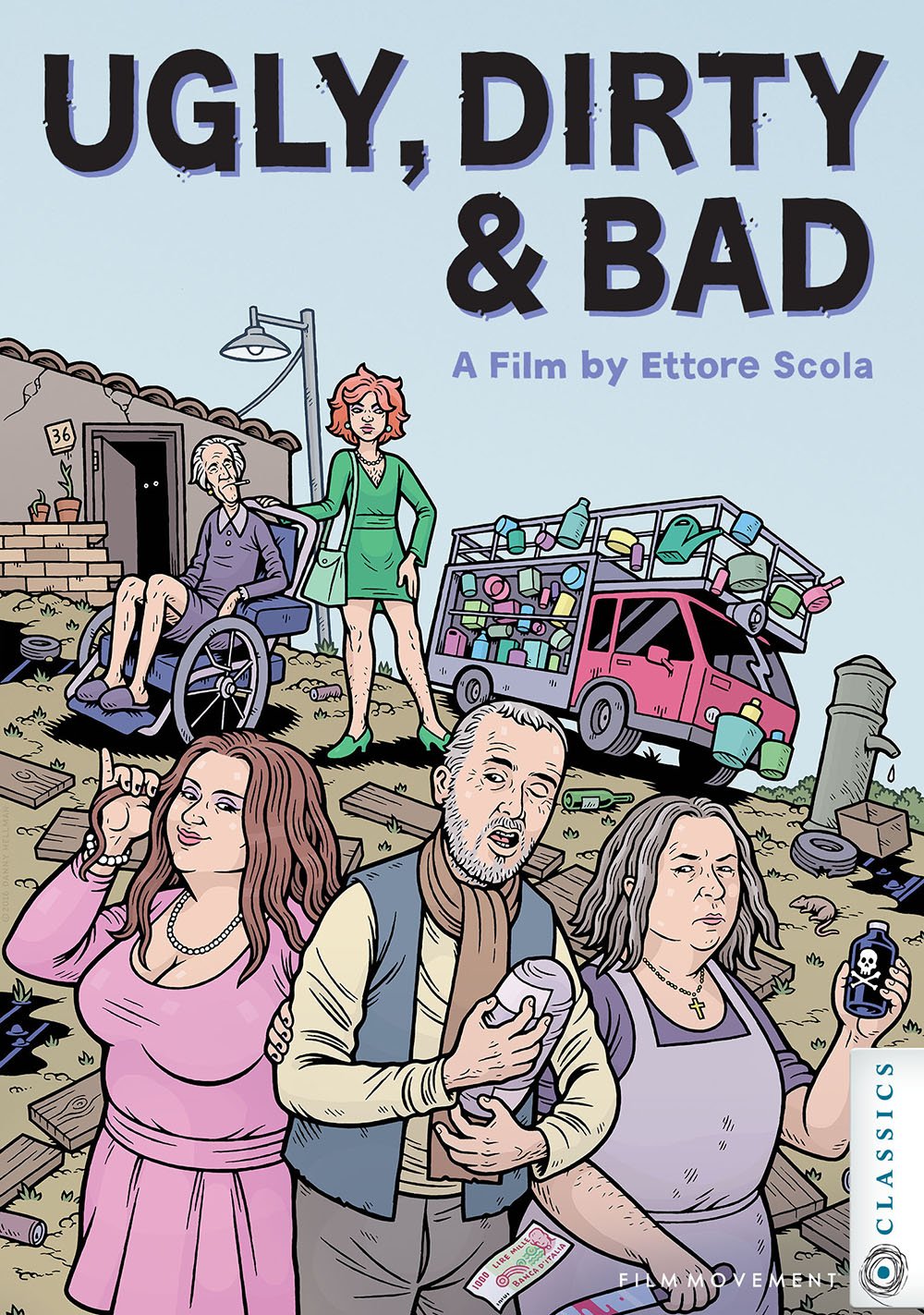
Reviewing the Film Movement Classics November 1, 2016 DVD and Blu-ray releases of the newly restored version of the wonderfully raunchy and perverse 1976 Italian comedy "Ugly, Dirty & Bad" provides a nice tiramisu walk after a few months of striving to convey the awesomeness of an (ongoing) string of exceptional films that Movement and other indie film distributors have been putting out there. Director Ettore Scola winning the Best Director award at Cannes for "Dirty," and the Film Society of Lincoln Center beginning 40th anniversary showings on October 21, 2016 in the wake of sold-out screenings this summer all show that this one is must see.
The Classics releases and scads of other (Unreal TV reviewed) DVD and BDs of comparably odd cult classic films from around the world further earns Movement president (and righteous dude) Michael Rosenberg a seat of honor with both the Lincoln Center society and the American Film Institute. These sets provide a badly needed alternative to the releases of the deplorable garbage that major studios dump on the American public.
Scola introduces us to the too-many-to-count members of the Mazzatella family as they are sleeping wall-to-wall and shoulder-to-shoulder in their they wish it was a shack home in a shanty town in Rome that looks like a village in an impoverished region of a developing nation. The proverbial (and cliched) 25-words-or-less description of this clan is that they literally are constantly at each other's throats and have their hands in each other's pockets. This is not to mention that they often get into each other's pants.
Early (and oft repeated commotion) that soon erupts revolves around patriarch Giacinto, who hits the trifecta regarding the adjectives in the film title, ranting about his relatives trying to steal the million lire in cash that he has a settlement for an accident that is responsible for losing an eye. A related complaint is that his wife, children, grandchildren, mother, and spouses of his children are freeloading parasites. Italian film royalty Nino Manfredi makes all this hilarious in his portrayal of Giacinto.
Much of the first half of "Dirty" gives Giacinto and members of his shameless clan their moment in the sun. Daughter Tommasina is a stripper/nude model whose mother proudly shows off a centerfold of her to a drooling pack of Vespa-riding late teens (including the especially crude brother of said working girl) boys.
The award for scene-stealing offspring goes to the unshaven transvestite prostitute brother who is ambiguously either gay for pay or bisexual. His antics include leaving his wig on and merely hitching up his dress to enter a willing sister-in-law from behind as she washes her hair in the middle of the one-room abode. The taunting by this woman is hilarious.
Growing resentment on both sides regarding Giacinto denying requests to share his wealth and this leader of the pack moving his mistress (who quickly discovers the realities of her new life) into the marital bed without moving his wife out leads to a plot to commit patricide. Things going comically awry during a related last supper only amps up the hostility and the hilarity.
The above-mentioned very strong feral elements of "Dirty" both fuel the exceptional humor and provide the shock value that makes the film the classic that it is. A final shot that highlights the contrast between the shanty town and not-so-far away downtown area of Rome both shows that a far different existence than the one that we know and tolerate is out there and is not so far away either geographically or behaviorally.
A middle-class father whose teen son begs him for the latest and greatest Smart phone may feel the same type of resentment as Giacinto experiences when a parasite looks for a few thousand lire for a small luxury; the only difference is that the white-collar guy does not actually physically lash out at the offensive offspring.
The special features include commentary by Columbia Film Studies Professor/New York Film Festival Director Emeritus Richard Pena and an essay by film scholar Ronald Bergen. The latter wonderfully summarizes how the film comes to be and notes how it reflects the politics and life in Italy as well as more universal truths.
Anyone with questions or comments regarding "Ugly" is strongly encouraged to email me; you can also connect on Twitter via @tvdvdguy.
No comments:
Post a Comment